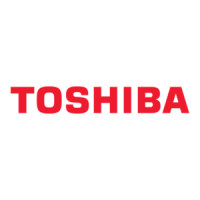
Do you have a question about the Toshiba RAV-SM561AT-E and is the answer not in the manual?
| Cooling Capacity (kW) | 5.0 |
|---|---|
| Heating Capacity (kW) | 5.6 |
| Energy Efficiency Ratio (EER) | 3.21 |
| Coefficient of Performance (COP) | 3.61 |
| Refrigerant | R410A |
| Outdoor Unit Noise Level | 50 dB(A) |
| Outdoor Unit Dimensions (WxHxD) | 780 x 550 x 290 mm |
| Indoor Unit Weight | 12 kg |
| Power Source | 220-240V, 50Hz |
Detailed specifications for RAV-SM561AT-E and RAV-SM801AT-E models.
Detailed specifications for RAV-SM1101AT-E and RAV-SM1401AT-E models.
Dimensional drawings and external views of the RAV-SM561AT-E outdoor unit.
Dimensional drawings and external views of the RAV-SM801AT-E outdoor unit.
Dimensional drawings and external views of RAV-SM1101AT-E and RAV-SM1401AT-E units.
Schematic diagram illustrating the refrigerant flow for the RAV-SM561AT-E.
Schematic diagram illustrating the refrigerant flow for the RAV-SM801AT-E.
Refrigerant flow schematics for RAV-SM1101AT-E and RAV-SM1401AT-E.
Electrical wiring diagrams for different models of the air conditioner.
Lists and specifications for electrical parts used in the units.
Essential safety precautions for handling R410A refrigerant.
Details on copper pipes, flare joints, and socket joints for R410A.
Dimensions for flare processing and flare nuts for R410A and R22.
Flare dimensions for R22 and tightening torque reference values for R410A.
List of specialized tools required for R410A air conditioner installation.
Step-by-step guide for recharging refrigerant into the system.
Information on brazing filler materials and the purpose of flux.
Techniques to prevent oxidation during brazing and material compatibility.
Overview of outdoor unit controls and the print circuit board layout.
Explanation of key control functions like PMV, temperature release, and current release.
Details on cooling fan control based on sensor inputs and temperature ranges.
Heating fan control logic and compressor coil heating function.
Preventive controls for short intermittent operation, high pressure, over-current, and current shift.
Logic and conditions for initiating and ending defrost operation in heating mode.
General guidelines and steps for troubleshooting air conditioner issues.
Troubleshooting steps specific to wireless remote controller models.
List of error codes detected by the indoor unit, their causes, and solutions.
Error codes, causes, and judgment measures for outdoor unit malfunctions.
Error codes related to communication failures with remote controllers or network adapters.
How to interpret outdoor unit LED status for error diagnosis.
Table mapping error codes to specific LED display patterns for diagnosis.
Troubleshooting procedures for central control errors like E01 and E09.
Step-by-step troubleshooting for E04 error related to outdoor unit operation.
Troubleshooting for E10, E18, E08, L03, L07, L08, L09 errors.
Troubleshooting procedures for L20, L30, and b7 errors involving communication.
Troubleshooting steps for P01, P10, and F10 errors related to fan, drain, and sensors.
Troubleshooting procedure for P12 error related to the indoor fan motor.
Troubleshooting steps for P22 error concerning the outdoor fan motor.
Troubleshooting for P19 (4-way valve) and F02 (TC sensor) errors.
Troubleshooting procedures for F01 (TCJ sensor) and P26 (IPDU) errors.
Troubleshooting steps for P29 (IPDU position) and H03 (current detection) errors.
Troubleshooting procedures for sensor errors F06, F04, and F08.
Troubleshooting for L29 (IPDU/CDB communication) and H02 (compressor) errors.
Troubleshooting steps for P03 (discharge temp) and H01 (compressor breakdown) errors.
Troubleshooting procedure for P04 (high-voltage protection) error.
Troubleshooting for 97 error related to central controller communication.
Troubleshooting for E03 (master unit comms), F29 (EEPROM), and P31 (sub unit) errors.
Graphs showing resistance values of temperature sensors versus temperature.
How to use the central remote controller's CHECK display for troubleshooting.
Table listing error codes detected by the indoor unit, their causes, and solutions.
Continuation of the indoor unit error code table with additional entries.
Table listing error codes detected by the outdoor unit and their causes.
Procedures for refrigerant recovery and descriptions of outdoor unit controls.
Steps for disassembling and reassembling outdoor unit components.
Procedures for removing and installing the front cabinet of the outdoor unit.
Steps for removing and installing the inverter assembly.
Procedures for removing and installing the control P.C. board assembly.
Steps for detaching and attaching the fan motor and propeller fan.
Procedures for removing and installing the compressor and reactor.
Steps for removing and installing the PMV coil and fan guard.
Procedures for front panel and ceiling plate removal/installation.
Steps for removing and installing discharge port and side cabinets.
Disconnecting connectors and attaching the inverter assembly.
Procedures for disconnecting and installing the cycle P.C. board.
Steps for removing and installing the IPDU P.C. board.
Procedures for fan motor and propeller fan removal and attachment.
Steps for removing and installing the compressor and PMV coil.
Procedures for removing and attaching the fan guard and bell mouth.
Illustrated breakdown of the outdoor unit with a list of all parts.
Detailed list and diagram of various components and sensors.
Illustrated breakdown of the outdoor unit for different models and parts list.
Detailed view and list of PC boards and sensor components.



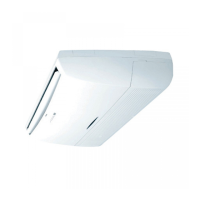



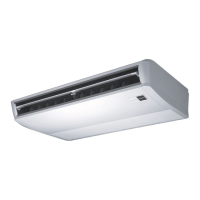
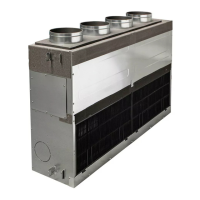
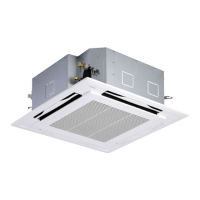

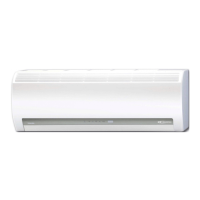
